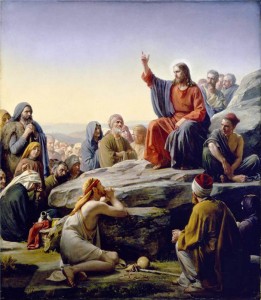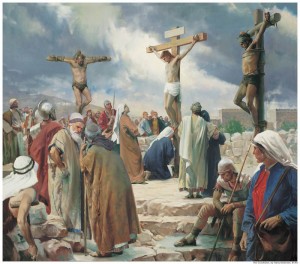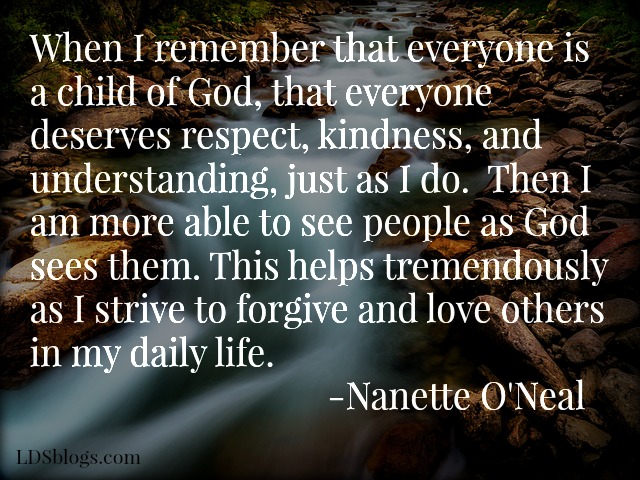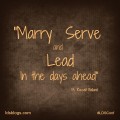Last week I wrote about the classic tale of the ant and the grasshopper as told by the Greek storyteller, Aesop. It was a story about work ethics and being prepared in times of famine. This story serves a great purpose, especially as it teaches children the values of work and preparedness. But I’d like to take Aesop on a walk with Christ, and see what more he can learn.
Build upon the morals—add Christ-like wisdom to this fable
There is value in stories where animals or insects play the main role. They allow us to think of the insects as creatures going about their nature. We thus devote our attention to the moral of the story, in this case, the importance of hard work and preparedness.
But we are human beings, and we interpret stories using our human values and behaviors as a model. We place ourselves in the situations and ask the hard questions. Why did the grasshopper mock the ants? Didn’t he remember from last year? Were the ants being selfish? When we do this, we contemplate more in-depth meaning to the story. We may even feel uncomfortable with the ending, thinking, there is something missing. There is something missing: it is the Christ-like wisdom that transcends the simple fable—how we deal with our fellow man.
How did Christ teach?
 In Matthew, chapter 5 of the Holy Bible, Jesus taught what we call the Sermon on the Mount. It is a set of higher laws that transcend the basic laws of Moses. These laws deal with how to treat others. He teaches the blessings of being meek and merciful, to hunger after righteousness, to be pure in heart. He teaches us to be peacemakers and to revile against evil. He assures us we will qualify for the blessings of the kingdom if we do these things, because he has come to fulfill this law. So with these higher principles in mind, let’s revisit the ant and the grasshopper.
In Matthew, chapter 5 of the Holy Bible, Jesus taught what we call the Sermon on the Mount. It is a set of higher laws that transcend the basic laws of Moses. These laws deal with how to treat others. He teaches the blessings of being meek and merciful, to hunger after righteousness, to be pure in heart. He teaches us to be peacemakers and to revile against evil. He assures us we will qualify for the blessings of the kingdom if we do these things, because he has come to fulfill this law. So with these higher principles in mind, let’s revisit the ant and the grasshopper.
Are you a grasshopper or an ant? The truth may surprise you.
Where do you see yourself in this fable? If we are honest with ourselves, we have played both roles in life. We have been the wise ant, working hard and preparing for the future. We may also see a little bit of grasshopper in us, being less than wise, forgetting to plan, or being distracted by the whims of the moment. We may also have been bitten by the bug of arrogance, judging or mocking others for their own foolish ways, which in some respects is what both the ant and the grasshopper did to each other. In order to get the most value of this fable, we should recognize our behavior when it is good and when it is bad, and do our best to refine it each day.
Recognize the value for what it is worth
Christ said, “If you love me keep my commandments.” He wants us to show our love for Him by doing his will. Part of His will is to work hard and prepare for times of famine. But the higher law states we should love one another as he has loved us. The fable does not take into account the higher law—but our Savior expects us to. If He expects us to, then we absolutely can do it, with His help.
Forgive us as we forgive others
In the fable, the g rasshopper called the ant foolish. I have been made to feel foolish for my values, my religious beliefs, even my talents. But the Savior taught us to forgive those who trespass against us. Even as He hung on the cross, He was able to forgive those who crucified Him. He realized they did not understand what they were doing. I truly believe when other people scoff or try to ridicule us, they too truly do not understand what they are doing. Often times the ridicule stems from internal grief and pain which they may struggle in dealing with. They lash out due to some unknown sufferings of their heart. When I remember that everyone is a child of God, everyone deserves respect, kindness, and understanding, just as I do, I am more able to see people as God sees them. This helps tremendously as I strive to forgive and love others in my daily life.
rasshopper called the ant foolish. I have been made to feel foolish for my values, my religious beliefs, even my talents. But the Savior taught us to forgive those who trespass against us. Even as He hung on the cross, He was able to forgive those who crucified Him. He realized they did not understand what they were doing. I truly believe when other people scoff or try to ridicule us, they too truly do not understand what they are doing. Often times the ridicule stems from internal grief and pain which they may struggle in dealing with. They lash out due to some unknown sufferings of their heart. When I remember that everyone is a child of God, everyone deserves respect, kindness, and understanding, just as I do, I am more able to see people as God sees them. This helps tremendously as I strive to forgive and love others in my daily life.
Because I have been given much I too must give
My church teaches us to keep long term food storage items for the length of a year. While I always had short-term food storage, this concept was new to me. I used to stress over this, as I didn’t see how I could meet this demand. We were not in a position to store a year’s supply. I went to our bishop to confess my problem. What if we had a natural disaster or some other type of emergency? We would not be able to sustain ourselves. His answer opened my eyes to the true nature behind long-term storage. He said, “But my family does have a year’s supply. We have it, so we can share it.” The eyes of my understanding about this principle were opened. All this time I thought the preparedness was for the individual. This kind bishop taught me the principle of charity. Having more means giving more. I felt a complete sensation of peace wash over me. I knew my needs would be cared for even if I could not meet the demands myself. My heart was blessed with the knowledge that others would be there for me if I could not do it alone. It actually strengthened my resolve to step up and help those in need. Years have passed since I met with that bishop, and we now have an adequate supply in storage—more than enough—for ourselves and to help others who may be in need.
Teach by example—don’t judge the actions or time table of others
In the Book of Mormon, a wise king, King Benjamin, taught how we should impart of our abundance to the poor and needy. He compared it to our relationship with God. Heavenly Father has everything, and in comparison, we have nothing—and yet He has promised to give us all that He has, whether we think we deserve it or not. This is the greatest example of love unfeigned. He loves each of His children so much, He is willing to give His son’s life for us. If we can step out of our prideful nature and take a lesson from those who teach the higher law, we can more readily give to those in need. Since what we have comes from God to begin with, why not share it when we can?
How justice and mercy work together
I’ve heard some people change the fable, making the ant the villain and the grasshopper the sympathetic victim. Doing so does not enhance the story but simply flips the nature of the two characters, ignores their virtues and magnifies the flaws of each. It downplays the moral that Aesop taught—the value of hard work and preparedness. If this basic lesson is ignored, then we can’t build upon it with the higher law established by Jesus Christ.
Rather than change the story, let’s add the wisdom of the gospel to both characters. It is justice to work hard and prepare. It is justice to reap what you sow. It is mercy to forgive others when they make foolish choices. It is mercy to open our hearts and understand the nature of other people. It is mercy to give of our abundance to those who cannot help themselves. The blessings that come when we keep the commandments—especially the ones that associate with how we treat our fellow man—elevate our spirit ever higher. They lead us closer to our Father in Heaven, closer to our heavenly home.
About Nanette ONeal
Nanette O'Neal loves the gospel and is very happy to share her testimony on LDS Blogs. She is a convert to the church and still feels the spirit burn strong within her heart. She graduated from Mason Gross School of the Arts with a degree in music education and has taught children and adults in the private and public sphere for over twenty years. Nanette continues to study the gospel and the art of writing. She writes weekly inspirational articles on her blog and is currently working on an LDS fantasy novel series, A Doorway Back to Forever. You can find her at NanetteONeal.blogspot.com. Nanette has a wonderful husband, talented son, and three beautiful dogs.








I love this! It is so hard to remember but it does make such a difference. What a blessing to have the gospel perspective.